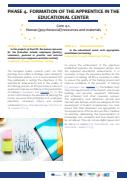PHASE 4. FORMATION OF THE APPRENTICE IN THE EDUCATIONAL CENTER Core 4.1. Human (psychosocial) resources and materials ITEM 4.1.1Educational Center In the projects of Dual PF, the human resources for the formation include: employees (faculty), volunteers, personal in practice and external collaborators (as companies and other entities) Completely /-Enough / Something / Nothing The European quality systems point out that planning must reflect a strategic vision shared by the interested parties, so it is recommended that they participate in setting the objectives, in the educational achievements and in the quality of the training process. All this promotes a culture of quality and improves confidence in the presentation of training [1. European. See: EQAVET P4, I1]. The center must include in the educational planning the human resources that participate in it: employees (teachers), volunteers, interns and external collaborators. [two. International. See: ISO 21001:20 18 – Section 7.1.2.1].ITEM 4.1.2 Educational Center In the educational center exist appropriate installations for learning Completely / Enough / Something / Nothing To ensure the achievement of the objectives established between the interested parties, and the expected educational achievements, it is necessary to have the necessary facilities for the provision of training. All this is necessary in order to ensure the quality of the training process and improve confidence in the provision of training [1]. European. See: EQAVET I1]. The facilities must meet the requirements of the student, and include buildings and grounds; equipment (hardware and software); and other necessary services. The organization must determine, provide and maintain safe facilities, which are adequate for the development of student competencies. You must ensure that their dimensions are appropriate to the requirements of those who use them. Facilities for teaching, self-learning, the implementation of knowledge, rest, recreation and food should also be considered. They can include digital spaces and be indoor or outdoor [2]. International. See: ISO 21001:2018 – Section 7.1.3].
